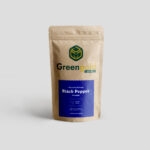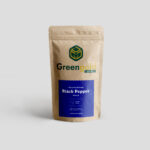Black pepper, the King of Spices, is not only renowned for its flavor and health benefits, but it can also be cultivated sustainably! 🌍💚
As consumers become more aware of environmental issues, eco-friendly farming practices are becoming essential in the spice industry. Growing black pepper using sustainable methods helps protect the planet while producing high-quality peppercorns for your kitchen. 🌱✨
👉 Discover our eco-friendly black pepper at Greengold Guide!
Let’s explore some eco-friendly ways to grow and harvest black pepper and why these methods are crucial for the planet!
🌿 Sustainable Growing Practices for Black Pepper
Black pepper (Piper nigrum) thrives in tropical climates, and its cultivation can have a positive impact on the environment if done sustainably.
Here’s how eco-conscious farmers are growing black pepper in an earth-friendly way:
1. 🌱 Agroforestry Systems
Agroforestry is the practice of growing crops alongside trees, creating a diverse ecosystem that supports biodiversity and reduces environmental impact. 🌳
- Benefits: Helps with soil fertility, prevents erosion, and creates a healthy habitat for wildlife.
- Why it works for black pepper: Black pepper grows well when interplanted with trees like banana, coconut, or cardamom, which offer shade and maintain moisture levels.
2. 🌿 Organic Farming Practices
Organic farming focuses on avoiding synthetic fertilizers and pesticides, allowing the soil to maintain its natural health. By using compost, cover crops, and crop rotation, organic farming improves soil quality and supports long-term sustainability. 🌍
- Benefits: Promotes a healthier environment, reduces water contamination, and supports better biodiversity.
- Why it works for black pepper: Organic fertilizers provide essential nutrients without harming the soil, and pesticide-free farming protects both the ecosystem and human health.
👉 Shop organic and sustainable black pepper at Greengold Guide!
🌿 Eco-Friendly Harvesting Methods
Harvesting black pepper is a delicate process, and using eco-friendly techniques ensures minimal damage to the environment while maximizing the quality of the spice. Here are some green methods for harvesting black pepper:
1. 🌾 Hand Harvesting
Many farmers still hand-harvest black pepper, which is a slow and careful process that ensures only the best pepper berries are collected. This method is labor-intensive but is gentler on the plant, reducing damage to the vines.
- Benefits: Minimizes mechanical damage, preserves the integrity of the plant, and reduces energy consumption.
- Why it’s eco-friendly: Unlike machine harvesting, hand-picking eliminates the need for fossil fuels, reducing the carbon footprint.
2. 🍂 Sun Drying
Once harvested, black pepper berries are usually dried before being ground into powder. The eco-friendly way to dry pepper is by using the sun rather than energy-intensive drying machines.
- Benefits: Reduces energy use and preserves flavor by using natural sunlight.
- Why it’s eco-friendly: Sun drying minimizes electricity consumption, making it a green alternative to mechanical dryers.
👉 Support sustainable harvesting with Greengold Guide’s black pepper!
🌿 Water Conservation in Black Pepper Farming
Black pepper requires a steady supply of water, but farmers are becoming more mindful of how much they use. Water conservation is key to making pepper farming more sustainable.
1. 🌍 Rainwater Harvesting
Some black pepper farmers use rainwater harvesting systems to collect and store rainwater during the wet season. This water can then be used to irrigate the pepper plants during dry spells, reducing dependence on local water sources.
- Benefits: Reduces water consumption from natural resources and ensures water availability during dry months.
- Why it’s eco-friendly: Collecting rainwater reduces the strain on local water systems, preserving natural ecosystems and improving water management.
2. 💧 Drip Irrigation
In areas where water is limited, drip irrigation is an efficient method for providing water directly to the roots of the plants. This precise watering technique helps to minimize water wastage.
- Benefits: Reduces water waste and ensures that each plant gets the correct amount of moisture.
- Why it’s eco-friendly: Drip irrigation minimizes runoff and ensures that water is used efficiently, which is especially important in water-scarce regions.
👉 Explore sustainable farming methods with Greengold Guide’s black pepper!
🌿 Supporting Fair Trade and Sustainable Farmers
When you choose eco-friendly black pepper, you’re not just helping the environment — you’re also supporting ethical farming practices.
Many farmers who grow black pepper sustainably are also part of Fair Trade programs, which ensure that they are paid fairly for their hard work and receive support for improving their farming methods.
- Benefits: Fair wages, better working conditions, and long-term support for farmers.
- Why it’s important: Sustainable farming and fair trade go hand in hand to create a more ethical, responsible spice industry.
👉 Join the movement for ethical spice farming with Greengold Guide!
🌱 Why Choose Greengold Guide’s Eco-Friendly Black Pepper?
At Greengold Guide, we are committed to providing the purest and most sustainable black pepper on the market. Our pepper is ethically sourced and grown with a focus on environmental protection and farmer well-being.
- 100% Organic — No chemicals, just pure, natural black pepper. 🌿
- Sustainably Sourced — We prioritize eco-friendly and fair trade farming practices. 🌍
- Freshly Ground — For the best flavor and health benefits. 🌱
👉 Shop Greengold Guide for the best eco-friendly black pepper today!


